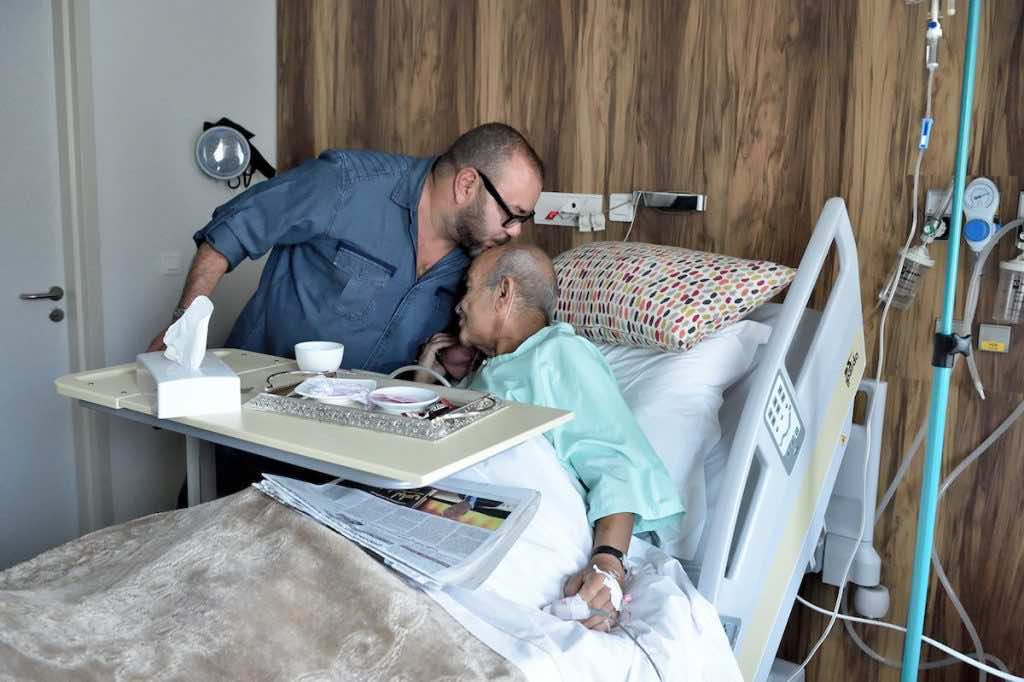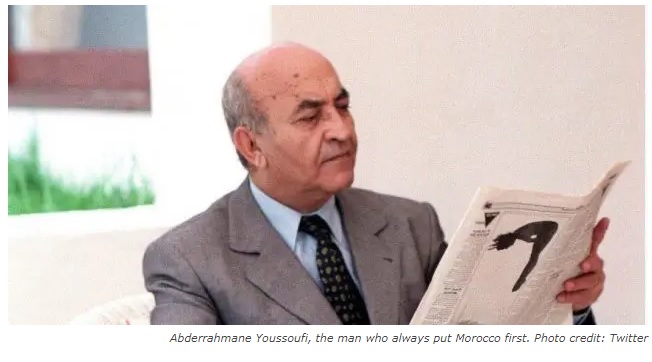Liberation News
Abderrahmane Youssoufi, a man who lived his life with integrity, strong principles, and unwavering commitment to Morocco, died in the early hours of Friday, May 29, 2020.
As the nation mourns the socialist icon and former prime minister, Morocco World News looks back at his extraordinary life and the incredible sacrifices he made to always put Morocco first.
Youssoufi was born during the Rif war in Tangier on March 8, 1924, and learned about patriotism and sacrifice for the homeland from a very early age. At the time of his birth, Morocco was still under the French protectorate, and Youssoufi’s family was among those dedicated to the liberation of their country.
The Youssoufi family were of Amazigh (Berber) origin, and the future prime minister spoke only Tamazight (Berber language) and French until he began school, where he learned standard Arabic and Darija (Moroccan Arabic).
Sacrifice
The young Youssoufi’s first lesson in sacrifice came when his older brother, Abdeslam, spoke out against the French colonial powers. Authorities swiftly clamped down on Abdeslam, taking him into custody. His younger brother would never see him again.
In 1936, after completing his school certificate, Youssoufi left his family to pursue his education at the Moulay Youssef College in Rabat.
While studying in Marrakech, Youssoufi would have his next political awakening in the form of a new friendship with a charismatic and magnetic natural leader. Mehdi Ben Barka, destined to become one of the most significant figures in Moroccan socialism, took the younger student under his wing.
Through Ben Barka, Youssoufi joined a group of passionate young men who shared a vision: An independent Morocco. Youssoufi became a member of the Al Istiqlal (Independence) Party and, at only 19 years old, threw himself into the fight for a free Morocco.
On January 11, 1944, a day Morocco still celebrates, the newly formed Al Istiqlal Party presented the Manifesto of Independence for Morocco to French authorities. The manifesto called for a liberated Morocco under the leadership of Mohammed V.
The manifesto called for a democratic, constitutional government to guarantee the rights of all Moroccans. Alongside the publication of the manifesto, demonstrations took place across the country, with the passionate Moulay Youssef college students in Rabat leading the fray.
The French colonial authorities responded quickly, clamping down on the movement and punishing those responsible for the upsurge in Moroccan nationalism.
The Moulay Youssef College expelled Youssoufi on January 29, 1944, for political activism. Unable to stay in Rabat, he drifted from Safi to El Jadida, relying on the kindness of friends, until he made the decision to settle in Casablanca.
Commitment
In Casablanca, Al Istiqlal Party leaders charged Youssoufi with leading trade unionism in the factories of the industrial city. He launched literacy programs for factory workers and helped to strengthen the trade union movement within the city.
In 1949, Youssoufi, still committed to his vision for a democratic, liberated Morocco, decided to move to Paris to pursue his education, in the belief that strengthening his own skills and widening his knowledge would arm him for the battle ahead.
In Paris, Youssoufi studied for a law degree, but his sojourn in Europe was not merely educational. The young revolutionary built on his network of contacts, mixing with key figures in the Moroccan independence movement, including Abderrahim Bouabid, who would later become head of the left-wing National Union of Popular Forces (NUFP).
Unable to turn a blind eye to injustice, Youssoufi became embroiled with the French movement for workers’ rights and immigrants’ rights. He advocated for immigrant workers, while growing a network of friends among the Parisian intelligentsia who would later be invaluable to him.
In 1952, Youssoufi returned to Morocco. Settling in his hometown, Tangier, he worked as a lawyer and rose to the position of president of the bar association.
Meanwhile, the struggle for Morocco’s independence had reached a climax. Youssoufi threw himself, once again, into harm’s way in the name of his country.
After Morocco finally won its independence in 1956, the country’s next journey began. So, too, did Youssoufi’s path.
The Al Istiqlal Party suffered an acrimonious split in Agadir in the early 1960s, with its leaders disagreeing over fundamental points of policy. Youssoufi, following his old friend Ben Barka and companion from his French sojourn Bouabid, left his old party for the newly formed NUFP.
In 1963, trouble came once again to Youssoufi’s door. An NUFP press release, published in Attahrir newspaper, laid out the party’s policies including the belief that the government’s responsibility is first to the Moroccan people, and then to its King.
Exile
Authorities accused the party of trying to overthrow the Moroccan monarchy and Youssoufi, along with his NUFP colleagues, faced arrest. He was charged with dissidence and handed a two-year prison sentence.
In March 1965, riots broke out in Casablanca and a brief but bloody conflict ensued between the Moroccan authorities and the socialist opposition. King Hassan II announced amnesty for the political leaders of the uprising, pledging increased freedom for opposition voices.
However, Youssoufi’s old friend and political ally Ben Barka disappeared soon after, presumed to have been assassinated. Youssoufi once again left Morocco for France, where for 15 years he engaged in human rights activism, never giving up on his dream for Morocco.
Youssoufi was, for years, unable to return to Morocco after the public prosecutor sentenced him to death for treason in a series of in absentia trials between 1969 and 1975.
In 1980, however, King Hassan II pardoned Youssoufi, meaning that the human rights advocate, who had lost none of his patriotism, could finally return home.
Back in Morocco, Youssoufi reunited with his old ally Bouabid, now the general secretary of a new political party born from the embers of the NUFP. The Socialist Union of Popular Forces (SUFP) continued to oppose the Moroccan government, supporting the unions through the 1981 general strikes and protesting mass arrests.
In 1992, Bouabid died, leaving the secretary-generalship of the party in Youssoufi’s hands. In 1993, Youssoufi led the party in protest against what he saw as an undemocratic general election. He left Morocco for France, perhaps fearing his vision for a modern, just Morocco would never come to fruition.
Clinging to his unwavering patriotism and commitment to his country, Youssoufi was not absent from Morocco for long. He continued to lead his party through lobbies and campaigns for increased democratic power and free speech.
Progress
After a constitutional reform in 1996, the country went to the polls for the 1997 general elections, leading to a landslide victory for the socialist party.
Then, on February 4, 1998, King Hassan II called on the 74-year-old Youssoufi to lead his government as prime minister.
Under Youssoufi’s premiership, Morocco saw tangible progress in the fields of human rights and freedom of speech.
In July 1999, a blow fell on Morocco in the form of King Hassan II’s death. While Morocco mourned his father, Mohammed VI, a young man with a view to reform, acceded to the throne.
According to a recently declassified US State Department Memo penned ahead of King Hassan II’s funeral, then President Bill Clinton’s National Security Adviser Samuel Berger greatly admired Youssoufi.
Berger told the president Youssoufi had made tangible progress in the “decentralization of authority, judicial reform, and the protection of human rights.”
Clinton’s script for his 1999 meeting with Youssouif reads: “I greatly admire what you have done throughout your life, your courage and your commitment to the causes of social justice and human rights.”
It continued, “You represent hope not only in Morocco but throughout Arab world for democratization and respect for human rights. [I] Hope you will be able to work well with the new King.”
King Mohammed VI and Youssoufi worked closely together on the transitional government and sparked initiatives to implement real change in Morocco.

Legacy
Youssoufi retired from politics in 2003, having handed on the reigns of government to a member of his own party.
Morocco will never forget his extraordinary commitment and vision.
In August 2019, while celebrating the 20th anniversary of his coronation, King Mohammed VI paid tribute to Youssoufi and the strength of their relationship.
King Mohammed VI honored Youssoufi by naming the 2019 cohort of graduating military recruits after him.
“I have decided to name this year’s Group of Graduates after Mr. Abderrahmane Youssoufi, who shares with my late father, His Majesty King Hassan II, and with me the same unwavering principles: love for the homeland and a strong commitment to the nation’s sacred values, to the Kingdom’s territorial integrity and to the defense of its best interests,” King Mohammed VI announced.
“I am proud of the solid ties and the special, mutual affection between myself and Mr. Youssoufi,” he said.
The monarch finished by calling on the recruits and on the Moroccan people to forever honor Youssoufi’s legacy, urging them “to live up to all this name stands for, namely integrity, commitment, adherence to principles and genuine patriotism.”







